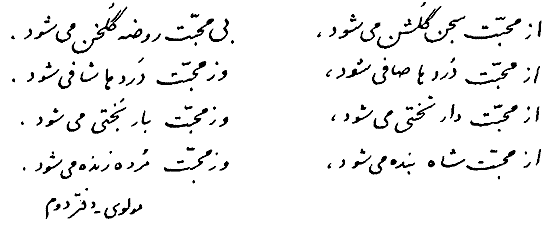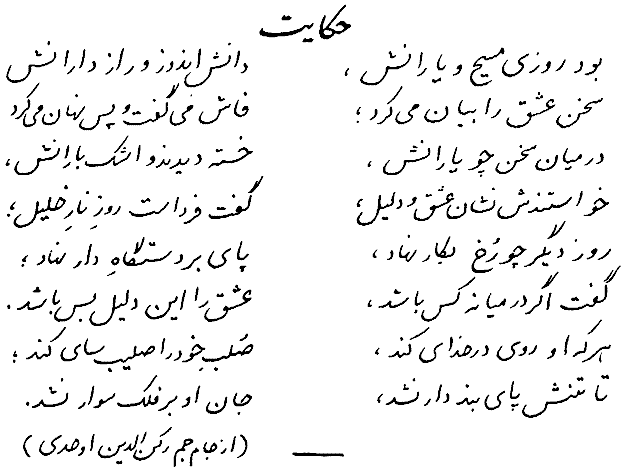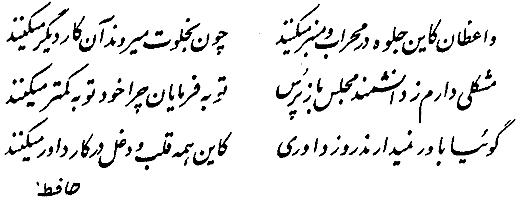 |
|
|---|
 |
|
|---|
|
1 Camberry Close Basingstoke Hants RG21 3AG U.K. ISBN 1-870312-04-X |
Christ and Christianity in Persian PoetryBishop Hassan Dehqani Tafti[ List of Books by Bishop Hassan Dehqani Tafti | گفتگویی با اسقف حسن دهقانی تفتی و همسرشان مارگارت ] | ||||||||||
|---|---|---|---|---|---|---|---|---|---|---|---|
|
¤ Introduction
1) Classical Poets from Ferdowsi onwards.
2) Modern Poets. |
Classical Persian Poets:
|

|
| 'Through love a prison becomes a rose bower
Through love dregs taste like pure wine Through love the stake becomes a throne Through love the King becomes a slave. Through love dead comes to life.' |
Now this is very similar to the thought in Phil. 2:7 & 8 about Christ:
'He made himself nothing, assuming the nature of a slave.... humbled himself.'
In other words the king became a servant. That is a Christian thought.
Of course, there is no evidence that Mowlavi had Christ in mind, but it is not impossible to think that he had, because there is a contemporary of his Rokn u'Din Owhady who has a beautiful poem in which Christ is mentioned. The poem is all about the mystery of suffering. The English translation of it is by Professor Arberry.
 |
| 'One day the Messiah was with his friends,
His disciples, the repositories of his secrets. He made exposition to them on the subject of love, Declared the matter openly and then concealed it. In the midst of his discourse, his companions saw He was weary, with tears streaming from his eyes. So they asked him for a sign and proof of love, He said: 'Tomorrow is the day of Abraham's fire'. Upon the next day, when he proceeded to his task And set his foot upon the plank of the gallows, He said: 'If there be any man present here, This surely is a sufficient proof of love. Whoever turns his countenance to God He must press his back againt the cross Until his body has been tied to the gallows His soul cannot mount up to heaven.' |
This is clearly the idea of the Cross.
This thought was prevalent at the time of Mowlavi, so it is not impossible for him to have written that lovely poem about love and about suffering, having been influenced by Owhady's poem.
Then, of course, there is the famous line by Sa'adi - which most Persians know by heart. The Revd. Norman Sharp has translated it thus:

|
| 'All human beings are in truth akin;
All in creation share one origion. When fate allots a member pangs and pains, No ease for other members then remains. If, unperturbed, another's grief canst scan, Thou are not worthy of the name of man.' |
These lines bring to mind Ch. 12 of I Cor. particularly v.26 -
'If one organ suffers, they all suffer together .......
Then there is the condemnation of hypocrisy. You find so much of this in Persian poetry - especially in Hafiz, for example those beautiful lines translated by Norman Sharp:
 |
|
'Those who preach persuasively in pulpit and in shrine
Act in private otherwise, and preaching undermine. I can hardly ask why preachers penitence commend, While it seems they always to repentance disincline. Possibly they think no judgement Day will topple them, Nor the judge assign for fraud a punishment condign.' |
The Gospels, of course, are full of this sort of thought. Christ condemned the Scribes and Pharisees and Saducees, the Mullahs of his day:
'Woe unto you, Scribes and Pharisees, hypocrites, forye devour widows' houses, and for a pretence make long prayers, ye pay tithe, but have omitted the weightier matters of the law, judgement, mercy and faith Woe unto you for ye make clean the outside of the cup and of the platter, but within they are full of extortion and excessye outwardly appear righteous unto men, but within ye are full of hypocrisy and iniquity.'(Matthew 23:14, 23 ff)
Then in Khayam - that famous quatrain, translated by Mr. Sharp:

|
|
'A cleric saw a fallen woman, and demurred,
And said, 'O evil strumpet' but the woman heard, And said, 'I am just what you called me, but, good sit, If you are what you claim to be, who has concurred?' Another translation of the same is by Arberry: 'A Sheikh addressed a prostitute,
|
This again reminds us of the famous story of Christ and the woman taken in adultery recorded in St. John 8:1-12:
'They took her to Christ and said 'She has been taken in adultery. She must be stoned, and He said 'He that is without sin, let him first cast a stone at her.'
Of course all the Mullahs realised they were sinners and went away.
 Please send your comments, questions & opinion to ChristInPersianPoetry@farsinet.com
Please send your comments, questions & opinion to ChristInPersianPoetry@farsinet.com
|  |
|---|